The interconnectedness of our world has never been more evident than in the realm of environmental impact. Regardless of where we live or the choices we make, the effects of our actions ripple across borders and impact ecosystems, communities, and future generations far beyond our immediate surroundings.
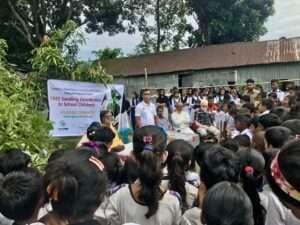
The Green Fund Initiative (GFI), originally established to support environmental projects within the United States, has evolved to embrace a broader vision—one that extends its impact far beyond national borders. Recognizing that environmental issues are inherently global, the GFI has embarked on a journey to implement projects worldwide by establishing partnership with local community based organizations. By fostering international cooperation, sharing knowledge, and supporting sustainable projects in diverse regions, GFI can contribute significantly to building a more environmentally sustainable and equitable world. As the organization takes on this exciting endeavor, it reinforces the idea that environmental responsibility and stewardship are responsibilities that transcend borders and unite people worldwide in the quest for a greener future.
Recently (September 13, 2023), the organization has distributed seedlings among the school children in rural areas of Bangladesh. In a world grappling with environmental challenges like climate change, deforestation, and biodiversity loss, it has become increasingly vital to instill a sense of environmental responsibility in the younger generation. Free distribution of seedlings among school children not only helps nurture a love for nature but also contributes to the broader mission of creating environmentally conscious citizens. In partnership with Bangladesh Biodiversity Conservation and Social Services Center (BCSSC), approximately 1000 seedlings have been distributed among the students.
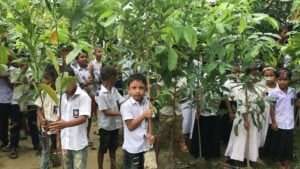
Planting the Seeds of Environmental Stewardship
Fostering Environmental Awareness
By providing school children with seedlings, we plant the seeds of environmental awareness and responsibility. This hands-on experience allows them to witness the magic of nature’s growth firsthand, fostering a deep connection with the environment. As these seedlings flourish into trees, students become more conscious of their role in preserving our planet.
Encouraging Active Participation
Free seedling distribution encourages active participation in environmental conservation. Children are not just passive recipients of information; they become active contributors to a greener world. This sense of involvement empowers them to take the initiative and make a difference in their communities.
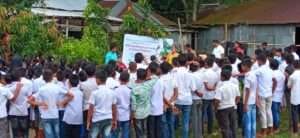
Teaching Valuable Life Skills
Planting and caring for seedlings teach children valuable life skills. They learn about patience, responsibility, and the importance of nurturing life. These skills extend beyond the garden, helping students develop a strong work ethic and a sense of responsibility that can be applied to various aspects of their lives.
Positive Impact of Distributing Seedlings to School Children
Improved Air Quality
Trees are natural air purifiers. By planting trees from seedlings, school children can actively contribute to improving air quality in their neighborhoods. Trees absorb carbon dioxide and release oxygen, making the air cleaner and healthier for everyone.
Combatting Climate Change
Trees are vital allies in the fight against climate change. They absorb carbon dioxide, a greenhouse gas that contributes to global warming. As these trees mature, they sequester more carbon, helping to mitigate the effects of climate change.
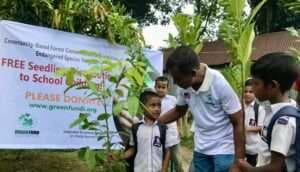
Enhancing Biodiversity
Trees provide habitats for various species of birds, insects, and other wildlife. By planting a diverse range of trees, we help support local biodiversity and create thriving ecosystems.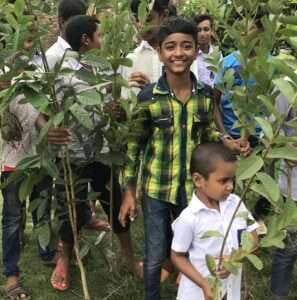
Beautifying Communities
The presence of trees enhances the aesthetic appeal of communities. Green spaces with well-maintained trees create a more pleasant environment, promoting a sense of pride and well-being among residents.
Building Stronger Communities
Seedling distribution events often involve community participation. This not only strengthens community bonds but also fosters a sense of shared responsibility for the environment. Communities that come together for such initiatives are more likely to collaborate on other projects aimed at improving their surroundings.
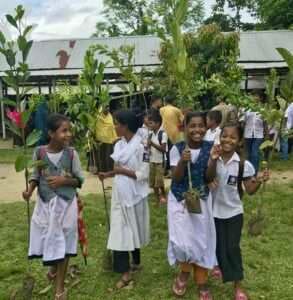 The free distribution of seedlings among school children is a powerful way to instill a sense of environmental stewardship and responsibility. It not only benefits the environment but also empowers the younger generation to take an active role in shaping a greener, more sustainable future. By nurturing the love for nature from an early age, we can cultivate a generation of environmentally conscious leaders who will continue to protect and preserve our planet for generations to come.
The free distribution of seedlings among school children is a powerful way to instill a sense of environmental stewardship and responsibility. It not only benefits the environment but also empowers the younger generation to take an active role in shaping a greener, more sustainable future. By nurturing the love for nature from an early age, we can cultivate a generation of environmentally conscious leaders who will continue to protect and preserve our planet for generations to come.
- Mohummad Kamrul Hassan, PhD
- For more information: hassan@greenfundi.org

